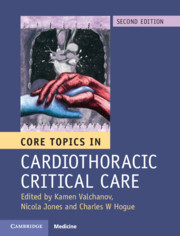52 results
Contents
-
- Book:
- Core Topics in Cardiothoracic Critical Care
- Published online:
- 15 June 2018
- Print publication:
- 05 July 2018, pp v-viii
-
- Chapter
- Export citation
Exercise Answers
-
- Book:
- Core Topics in Cardiothoracic Critical Care
- Published online:
- 15 June 2018
- Print publication:
- 05 July 2018, pp 467-469
-
- Chapter
- Export citation
Abbreviations
-
- Book:
- Core Topics in Cardiothoracic Critical Care
- Published online:
- 15 June 2018
- Print publication:
- 05 July 2018, pp xxix-xxxiii
-
- Chapter
- Export citation
Section 4 - Advanced Organ Support
-
- Book:
- Core Topics in Cardiothoracic Critical Care
- Published online:
- 15 June 2018
- Print publication:
- 05 July 2018, pp 172-209
-
- Chapter
- Export citation
Foreword
-
- Book:
- Core Topics in Cardiothoracic Critical Care
- Published online:
- 15 June 2018
- Print publication:
- 05 July 2018, pp xv-xvi
-
- Chapter
- Export citation
Section 2 - Practical Procedures
-
- Book:
- Core Topics in Cardiothoracic Critical Care
- Published online:
- 15 June 2018
- Print publication:
- 05 July 2018, pp 58-93
-
- Chapter
- Export citation
Contributors
-
- Book:
- Core Topics in Cardiothoracic Critical Care
- Published online:
- 15 June 2018
- Print publication:
- 05 July 2018, pp ix-xiv
-
- Chapter
- Export citation
Section 1 - Diagnosis
-
- Book:
- Core Topics in Cardiothoracic Critical Care
- Published online:
- 15 June 2018
- Print publication:
- 05 July 2018, pp 1-57
-
- Chapter
- Export citation
Section 6 - Perioperative Care: The Patient Post Cardiac Surgery
-
- Book:
- Core Topics in Cardiothoracic Critical Care
- Published online:
- 15 June 2018
- Print publication:
- 05 July 2018, pp 312-363
-
- Chapter
- Export citation
Section 5 - Acute Disorders
-
- Book:
- Core Topics in Cardiothoracic Critical Care
- Published online:
- 15 June 2018
- Print publication:
- 05 July 2018, pp 210-311
-
- Chapter
- Export citation
Section 8 - Provision and Delivery of Cardiothoracic Intensive Care
-
- Book:
- Core Topics in Cardiothoracic Critical Care
- Published online:
- 15 June 2018
- Print publication:
- 05 July 2018, pp 440-466
-
- Chapter
- Export citation
14 - Fluid Administration
- from Section 3 - Therapeutic Intervention
-
-
- Book:
- Core Topics in Cardiothoracic Critical Care
- Published online:
- 15 June 2018
- Print publication:
- 05 July 2018, pp 116-122
-
- Chapter
- Export citation
Scoring Systems and Prognosis
-
- Book:
- Core Topics in Cardiothoracic Critical Care
- Published online:
- 15 June 2018
- Print publication:
- 05 July 2018, pp xxiii-xxviii
-
- Chapter
- Export citation
Copyright page
-
- Book:
- Core Topics in Cardiothoracic Critical Care
- Published online:
- 15 June 2018
- Print publication:
- 05 July 2018, pp iv-iv
-
- Chapter
- Export citation
Preface to the Second Edition
-
- Book:
- Core Topics in Cardiothoracic Critical Care
- Published online:
- 15 June 2018
- Print publication:
- 05 July 2018, pp xvii-xviii
-
- Chapter
- Export citation
Section 7 - Disease Management in the Cardiothoracic Intensive Care Unit: Incidence; Aetiology; Diagnosis; Prognosis; Treatment
-
- Book:
- Core Topics in Cardiothoracic Critical Care
- Published online:
- 15 June 2018
- Print publication:
- 05 July 2018, pp 364-439
-
- Chapter
- Export citation
Index
-
- Book:
- Core Topics in Cardiothoracic Critical Care
- Published online:
- 15 June 2018
- Print publication:
- 05 July 2018, pp 470-484
-
- Chapter
- Export citation
Section 3 - Therapeutic Intervention
-
- Book:
- Core Topics in Cardiothoracic Critical Care
- Published online:
- 15 June 2018
- Print publication:
- 05 July 2018, pp 94-171
-
- Chapter
- Export citation

Core Topics in Cardiothoracic Critical Care
-
- Published online:
- 15 June 2018
- Print publication:
- 05 July 2018
List of abbreviations
-
- Book:
- A Surgeon's Guide to Anaesthesia and Peri-operative Care
- Published online:
- 05 July 2014
- Print publication:
- 05 June 2014, pp 317-319
-
- Chapter
- Export citation



